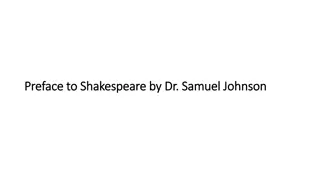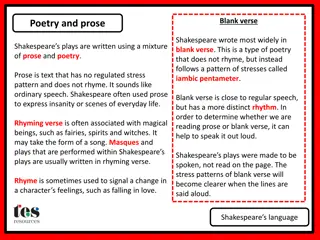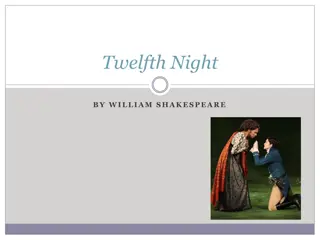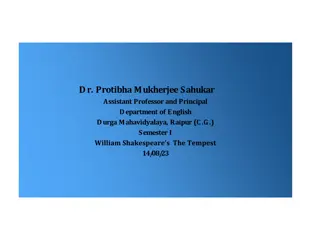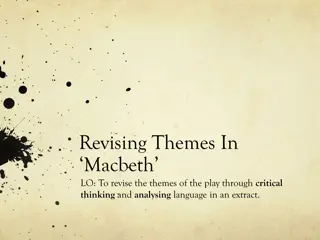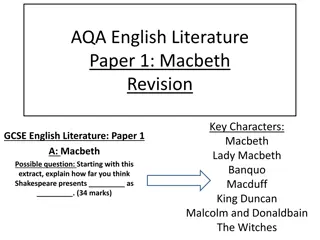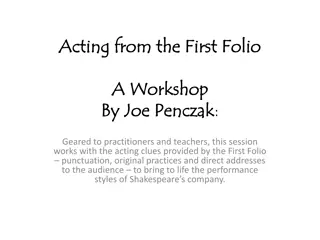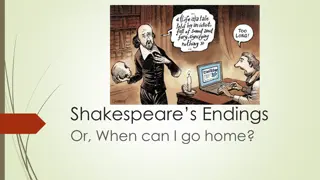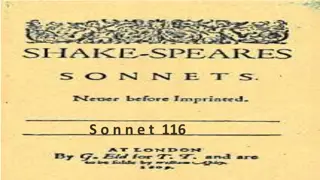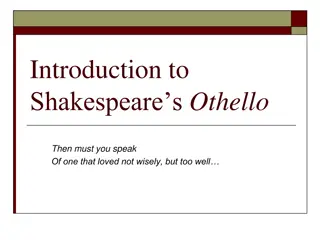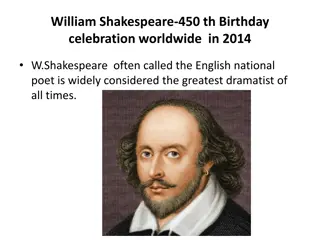Exploring the Life and Works of William Shakespeare
William Shakespeare, the renowned English playwright, poet, and actor, is celebrated for his exceptional literary prowess and deep understanding of human nature. Born in Stratford-upon-Avon, he rose to fame during a period of England's cultural renaissance, captivating audiences with his masterful plays that continue to be revered today. Despite initial skepticism about his background, Shakespeare's enduring legacy and contributions to the world of theater are undeniable.
Download Presentation

Please find below an Image/Link to download the presentation.
The content on the website is provided AS IS for your information and personal use only. It may not be sold, licensed, or shared on other websites without obtaining consent from the author. Download presentation by click this link. If you encounter any issues during the download, it is possible that the publisher has removed the file from their server.
E N D
Presentation Transcript
An Author Study of William Shakespeare 1. William Shakespeare is generally regarded as the world s greatest writer in the English Language because of his brilliant poetic language and his keen insight into human nature. 2. Shakespeare was born in Stratford- Upon-Avon Northwest of London. 3. His family did NOT have ties to any noble family and were what we would call middle class. 4. At 18 years old he married Anne Hathaway, a woman older than him.
5. England was a rising European power in Shakespeares day. The navy defeated the Spanish Armada and London was a successful commercial center. 6. Queen Elizabeth I ruled England and supported the arts. She enjoyed pageants and plays as well as classical literature. 7. London was a busy and growing city of nearly 200,000 people. 8. In 1592, Shakespeare was famous enough as a writer to be called an upstart crow by Robert Greene. 9. Shakespeare joined the acting company Lord Chamberlain s Men and helped to make them successful by writing their plays. 10. Even Queen Elizabeth came to see his plays. 11. In 1598 Francis Meres wrote that Shakespeare was the most excellent at both comedies and tragedies. 12. Shakespeare s fame and money allowed him to be a partner in the Globe Theatre, buy a large home called New Place, and buy his father a coat of arms. 13. When James I became king in 1603, Shakespeare s acting company changed their name to the King s Men.
14. In 1608, Shakespeares company leased a second theatre called the Blackfriars which worked better for winter performances. 15. Shakespeare died in 1616 and was buried in his home church in Stratford. His famous epitaph is; Good friend, for Jesus sake forbear To dig the dust enclosed here. Blest be the man that spares these stone, Cursed be he that moves my bones. 16. Some people have said that Shakespeare could not have written his plays because his family was not high class enough, but these claims have NO basis in solid fact.
17. The Renaissance brought England more interest in drama. 18. Private stage productions were held indoors in schools, royal palaces, and noblemen s homes. 19. Early public performances were held in the courtyards of inns. 20. In 1576, James Burbage opened the first public theatre outside of London in 1576 and called it the Theatre. 21. In 1599, the original Theatre was torn down, rebuilt in Bankside near the Rose and the Swan, and renamed the Globe. 22. Shakespeare referred to The Globe as the Wooden O.
23. The Globe was a wooden three-story building that could hold up to 3,000 people. 24. Poorer audience members of the Globe had to stand in a roofless courtyard and were called groundlings. 25. Wealthier audience member of the Globe sat in covered galleries. 26. Elizabethan actors needed to be able to memorize lines, sing, dance, wrestle, fence, clown, and weep. 27. The stage had NO front curtain. 28. If the audience disliked something in the play they would shout out or throw food. 29. The rowdiness of audiences that included pickpockets gave actors a bad reputation. 30. Women were NOT allowed to perform, so all of the actors were male.
31. In 1613, the Globes roof caught fire and destroyed the theatre. 32. The Globe was improved and rebuilt on the same spot where it stood for 30 more years until puritan leader Oliver Cromwell closed it and all of the theatres outside of London. 33. In 1644, the empty Globe was torn down to build tenement housing. 34. In 1997, American Sam Wanamaker opened a new Globe theatre just 200 yards from the site of the original. 35. The new theatre only seats1,500, because modern audiences would find it too crowded with the 3,000 people the original theatre held.



